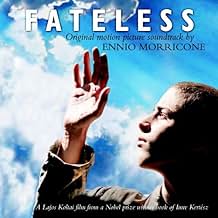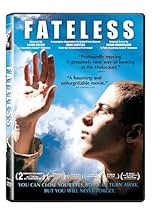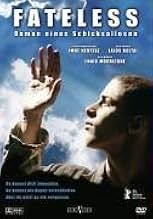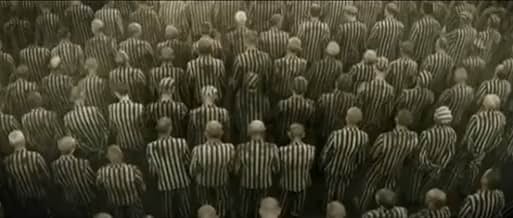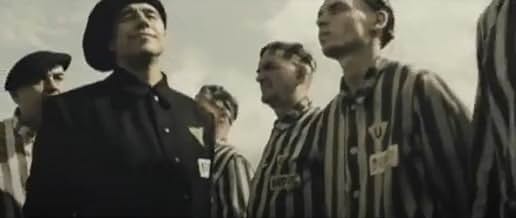PUNTUACIÓN EN IMDb
7,0/10
7,3 mil
TU PUNTUACIÓN
La vida de György, de 14 años, se desmorona en la Hungría de la Segunda Guerra Mundial, cuando es deportado primero a Auschwitz y luego a Buchenwald.La vida de György, de 14 años, se desmorona en la Hungría de la Segunda Guerra Mundial, cuando es deportado primero a Auschwitz y luego a Buchenwald.La vida de György, de 14 años, se desmorona en la Hungría de la Segunda Guerra Mundial, cuando es deportado primero a Auschwitz y luego a Buchenwald.
- Premios
- 6 premios y 7 nominaciones en total
Dániel Szabó
- Moskovics
- (as Dani Szabó)
Reseñas destacadas
'Sorstalansag' (FATELESS) is an inordinately powerful, quiet journey through a year in Nazi Concentration Camps at Auschwitz, Buchenwald, and Zeitz. Adapted by Imre Kertesz from his first novel, the story is semi-autobiographical as Kertesz spent a year of his youth in Auschwitz as a Hungarian Jew. Though Kertesz alters his novel of the life of one Gyorgy Koves, in a manner he carefully explains in one of the featurettes accompanying this DVD, the observational skills and tenor of his literate mind suffuse this surprisingly quiet depiction of life in a death camp.
We first meet Gyorgy Koves as a curly headed handsome 14-year old youth in 1944 bidding farewell to his beloved father as he departs for a labor camp. Wearing the yellow star of David proudly, Gyorgy has little understanding of what it is to be a Jew, a lesson he will learn in the coming year and affect his perception of the world and his place in it. Gyorgy's mother left his father and his father has remarried and requests that Gyorgy stay with his stepmother while he is away 'for a while' in the labor camp. Gyorgy is conflicted as he loves his mother but he does as his father requests. Almost inadvertently Gyorgy and his friends are taken off a bus and separated by the Nazis into trains bound for concentration camps. Gyorgy remains relatively naive about what is happening: his head is shaved, his worldly goods are absconded, and he begins the hellish life of survival in Auschwitz. Where Kertesz writes differently than other authors who have described Holocaust conditions is in his mindset of Gyorgy: Gyorgy strives to retain a sense of equilibrium in this bizarre new life, seeing certain events as probable errors, mistakes, or simply 'the way things are'. He endures starvation, brutal work, pain from an injured and infected knee, boredom, and observing sights of torture of his fellow prisoners. Though he is walking in a stunned world, he is still able to fine the little moments of 'happiness' because of his youthful outlook and creative mind. He gradually grows to understand what being a Jew means, and while he is unable to fathom all he sees in captivity, he learns that if he can't understand life in a concentration camp, how can he understand life outside either. Gyorgy is literally on the carts moving toward the crematorium when the Allies free the camp. He meets an American (Daniel Craig) who suggests he not return to Budapest, but go to America instead where he can pursue a new existence. Yet Gyorgy's devotion to family, to country, and to being a Jew returns him to Budapest where he finds a destroyed city that had been home and wanders the town square trying to make sense of it all.
As Gyorgy Koves, Marcell Nagy gives a stunning performance, a picture of a child/man who is forced to enter the world of adulthood via the horrors of Auschwitz. Nagy captures the essence of the character with minimal dialogue and maximum use of his body language and eyes. The supporting cast is superb, each creating vignettes in the few moments we see them that burn into our memory. The cinematography by Gyula Pados uses subdued color for the scenes outside the camps and a subtle sepia toned black and white or the scenes within the walls of the terrifyingly real buildings and yards of the camps. The musical score by Ennio Morricone sustains the mood throughout. But it is the director Lajos Koltai whose impeccable sensitivity to Kertesz' writing and vision that makes this long (140 minutes) film a seamless pondering of the passage of time - minute by minute, hour by hour, day by day, etc - that is the essence of Gyorgy's survival of a nightmare 'with little moments of happiness wherever they may happen'. This is a magnificent film, by a gifted crew, and though it contains visuals that will crush your heart, it must be seen to be believed. In Hungarian and German and English with subtitles. Highly Recommended. Grady Harp
We first meet Gyorgy Koves as a curly headed handsome 14-year old youth in 1944 bidding farewell to his beloved father as he departs for a labor camp. Wearing the yellow star of David proudly, Gyorgy has little understanding of what it is to be a Jew, a lesson he will learn in the coming year and affect his perception of the world and his place in it. Gyorgy's mother left his father and his father has remarried and requests that Gyorgy stay with his stepmother while he is away 'for a while' in the labor camp. Gyorgy is conflicted as he loves his mother but he does as his father requests. Almost inadvertently Gyorgy and his friends are taken off a bus and separated by the Nazis into trains bound for concentration camps. Gyorgy remains relatively naive about what is happening: his head is shaved, his worldly goods are absconded, and he begins the hellish life of survival in Auschwitz. Where Kertesz writes differently than other authors who have described Holocaust conditions is in his mindset of Gyorgy: Gyorgy strives to retain a sense of equilibrium in this bizarre new life, seeing certain events as probable errors, mistakes, or simply 'the way things are'. He endures starvation, brutal work, pain from an injured and infected knee, boredom, and observing sights of torture of his fellow prisoners. Though he is walking in a stunned world, he is still able to fine the little moments of 'happiness' because of his youthful outlook and creative mind. He gradually grows to understand what being a Jew means, and while he is unable to fathom all he sees in captivity, he learns that if he can't understand life in a concentration camp, how can he understand life outside either. Gyorgy is literally on the carts moving toward the crematorium when the Allies free the camp. He meets an American (Daniel Craig) who suggests he not return to Budapest, but go to America instead where he can pursue a new existence. Yet Gyorgy's devotion to family, to country, and to being a Jew returns him to Budapest where he finds a destroyed city that had been home and wanders the town square trying to make sense of it all.
As Gyorgy Koves, Marcell Nagy gives a stunning performance, a picture of a child/man who is forced to enter the world of adulthood via the horrors of Auschwitz. Nagy captures the essence of the character with minimal dialogue and maximum use of his body language and eyes. The supporting cast is superb, each creating vignettes in the few moments we see them that burn into our memory. The cinematography by Gyula Pados uses subdued color for the scenes outside the camps and a subtle sepia toned black and white or the scenes within the walls of the terrifyingly real buildings and yards of the camps. The musical score by Ennio Morricone sustains the mood throughout. But it is the director Lajos Koltai whose impeccable sensitivity to Kertesz' writing and vision that makes this long (140 minutes) film a seamless pondering of the passage of time - minute by minute, hour by hour, day by day, etc - that is the essence of Gyorgy's survival of a nightmare 'with little moments of happiness wherever they may happen'. This is a magnificent film, by a gifted crew, and though it contains visuals that will crush your heart, it must be seen to be believed. In Hungarian and German and English with subtitles. Highly Recommended. Grady Harp
Sorstalanság (Fateless) is the memoir of Imre Kertesz's survival of the Shoah. He won the Nobel Prize for literature in 2002, despite being relatively unknown in the West. At the time, many thought that this was "the Primo Levi prize", i.e. making up for the failure of the academy to award the Nobel to Levi, prior to his death in 1987 (the Nobel is never awarded posthumously).
If one has read Levi's Survival at Auschwitz, or Elie Wiesel's Night, many of the details of the story are familiar. But the craft is in the telling, and the director has done an excellent job of bringing a memoir of brutality and survival to life.
A brief synopsis, without spoilers, is that this is the story of a teenaged boy in Budapest in 1944 who is swept up in the Nazi roundup of Hungarian Jewry, and his experience in the concentration camps. (Elie Wiesel was interred in the same roundup.) The story of how Eichmann tried to ransom Hungarian Jewry to the West is interesting background, for those who are intellectually curious. (The allies were afraid to provide materiel and resources to the Nazis, fearing prolongation of the war. A very sad tale).
Making a film of the Holocaust is always a challenge. A director must strive to make the scenes powerful, without being melodramatic. There is also the danger of making another movie over again (eg, Schindler's List; The Reawakening; Europa, Europa). The challenge is to remain faithful to truth, while bringing artistry to the telling of it.
One device which is used to great effect is the use of very brief scenes, perhaps less than one minute, which tell a brief vignette of the daily life in the camps. Some have very little dialog, and they seem random and unconnected, yet together they add to a deeply moving experience.
Many films of the Holocaust are shattering; a few are hopeful. This is neither, but it is a telling of the story that is watchable for most audiences, yet retains the power to affect a viewer. 8 out of 10.
If one has read Levi's Survival at Auschwitz, or Elie Wiesel's Night, many of the details of the story are familiar. But the craft is in the telling, and the director has done an excellent job of bringing a memoir of brutality and survival to life.
A brief synopsis, without spoilers, is that this is the story of a teenaged boy in Budapest in 1944 who is swept up in the Nazi roundup of Hungarian Jewry, and his experience in the concentration camps. (Elie Wiesel was interred in the same roundup.) The story of how Eichmann tried to ransom Hungarian Jewry to the West is interesting background, for those who are intellectually curious. (The allies were afraid to provide materiel and resources to the Nazis, fearing prolongation of the war. A very sad tale).
Making a film of the Holocaust is always a challenge. A director must strive to make the scenes powerful, without being melodramatic. There is also the danger of making another movie over again (eg, Schindler's List; The Reawakening; Europa, Europa). The challenge is to remain faithful to truth, while bringing artistry to the telling of it.
One device which is used to great effect is the use of very brief scenes, perhaps less than one minute, which tell a brief vignette of the daily life in the camps. Some have very little dialog, and they seem random and unconnected, yet together they add to a deeply moving experience.
Many films of the Holocaust are shattering; a few are hopeful. This is neither, but it is a telling of the story that is watchable for most audiences, yet retains the power to affect a viewer. 8 out of 10.
'Fateless' was a never-seen blockbuster in Hungary if we can use the term for Hungarian movies. It attracted so many viewers that no Hungarian film has done before and as it's not surprising that a Holocaust-film like this divides the audience. Thousands of readers had fallen in love with Imre Kertész's Nobel-prized novel, and expectations in this case are very high. However this film does NOT have to make any disappointment and opposite to some critics' opinion it holds the same meaning the novel holds. Don't forget that Kertész is the screenwriter too, it is his true story, a man's who went through all these and kept the respect of life so could find happiness after and during this. He agreed this film's value. The movie has some great actors, wonderful pictures and lots of very good, atmospheric scenes with very real memorable characters. The score is extremely beautiful how it's natural if the composer is Ennio Morricone.
There are weaknesses too, of course, some dialogues, mainly in the beginning of the film are not natural (maybe it comes from Kertész's newness in film-writing), it' very disturbing as some weak acting in a few episodes. Marcell Nagy is not a bad choice for the leading role, he has the look and the power in his eyes but in speech he's not convincing, it drops you out of the atmosphere sometimes but it won't bother the not-Hungarian audience.
'Fateless' is an impressive European masterpiece, Hungary should be proud of it.
There are weaknesses too, of course, some dialogues, mainly in the beginning of the film are not natural (maybe it comes from Kertész's newness in film-writing), it' very disturbing as some weak acting in a few episodes. Marcell Nagy is not a bad choice for the leading role, he has the look and the power in his eyes but in speech he's not convincing, it drops you out of the atmosphere sometimes but it won't bother the not-Hungarian audience.
'Fateless' is an impressive European masterpiece, Hungary should be proud of it.
First of all, I have to tell, that I have not read the book yet, so I don't know how the book is like. But in my opinion the movie, in itself is really good. For me the movie had two major meanings. First, that all of us, who were not there in the camps, will never be able even to imagine how that was like. And the second, that people don't really listen to what you want to tell them, they listen to that, what they want to hear, and if your story does not satisfy them, because they want to hear something else, or because they can't accept your point of view, you will be left alone... And you will be lonely even among people of your own kind. And I think that's why this kid is fate-less, he himself tells at the and of the movie, he has to continue his life, which is not possible to continue, and he has to do this alone, because no one ever will understand him. Even fate has forsaken him.
Saw this film at the AFI Film Festival in Los Angeles. It is an amazingly well made, well acted motion picture about a very difficult subject. The direction and cinematography were excellent. The lead boy was only 12 when the film was shot, yet he delivers a mature, sensitive and deeply emotional performance.
The film is long but very compelling and speaks loudly about man's inhumanity to his fellow man. The message is even more disturbing when told through the eyes of a young teenager who is caught up in the atrocities of the Nazis and their Hungarian allies.
If this film were in English or directed by Steven Spielberg, it would no doubt win numerous awards. Let us hope that "Fateless" is recognized for it's bravery and excellence.
The film is long but very compelling and speaks loudly about man's inhumanity to his fellow man. The message is even more disturbing when told through the eyes of a young teenager who is caught up in the atrocities of the Nazis and their Hungarian allies.
If this film were in English or directed by Steven Spielberg, it would no doubt win numerous awards. Let us hope that "Fateless" is recognized for it's bravery and excellence.
¿Sabías que...?
- CuriosidadesThe production unexpectedly ran out of money halfway through and halted for several months in order to find new investors. This ended up working in its favor, since Marcell Nagy was going through puberty, and by the time they restarted, he looked physically more mature, taller, and his voice deeper. By the time his character enters and survives the death camp, he looks several years older than when the film began, adding an element of reality that otherwise would have been created with make-up.
- Citas
[last lines]
György Köves: [narrating] People only ask about the horrors, whereas I should talk about the happiness of the camps next time, if they ask. If they ask at all. And if I don't forget myself.
- Créditos adicionalesFlash v. Schwabenland, Production Dog
- Banda sonoraHoldvilágos éjszakán (On a Moonlit Night)
Music by Mihály Eisemann
Lyrics by István Zágon
Sung by the four boys when the group is in transit
Selecciones populares
Inicia sesión para calificar y añadir a tu lista para recibir recomendaciones personalizadas
- How long is Fateless?Con tecnología de Alexa
Detalles
- Fecha de lanzamiento
- Países de origen
- Sitios oficiales
- Idiomas
- Títulos en diferentes países
- Sense destí
- Localizaciones del rodaje
- Empresas productoras
- Ver más compañías en los créditos en IMDbPro
Taquilla
- Presupuesto
- 2.500.000.000 HUF (estimación)
- Recaudación en Estados Unidos y Canadá
- 196.857 US$
- Fin de semana de estreno en EE. UU. y Canadá
- 12.680 US$
- 8 ene 2006
- Recaudación en todo el mundo
- 2.512.009 US$
- Duración2 horas 20 minutos
- Color
- Mezcla de sonido
- Relación de aspecto
- 2.35 : 1
Contribuir a esta página
Sugerir un cambio o añadir el contenido que falta






